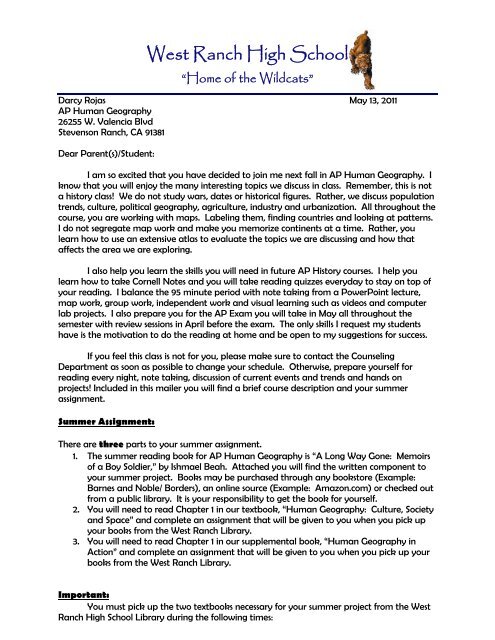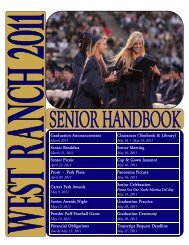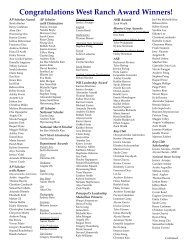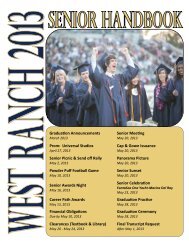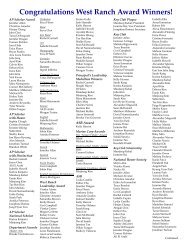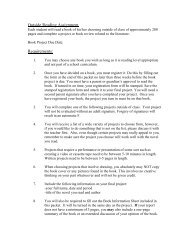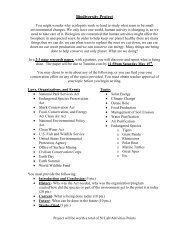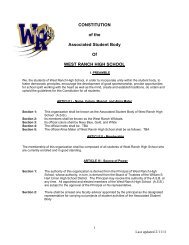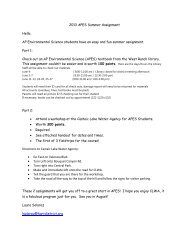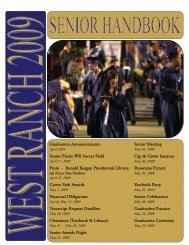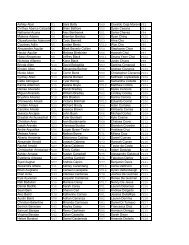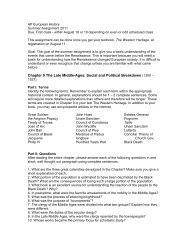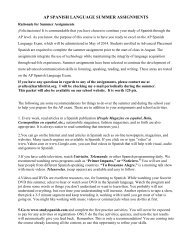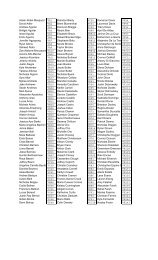Home Of The Wildcats - West Ranch High School
Home Of The Wildcats - West Ranch High School
Home Of The Wildcats - West Ranch High School
You also want an ePaper? Increase the reach of your titles
YUMPU automatically turns print PDFs into web optimized ePapers that Google loves.
<strong>West</strong> <strong>Ranch</strong> <strong>High</strong> <strong>School</strong>“<strong>Home</strong> of the <strong>Wildcats</strong>”Darcy Rojas May 13, 2011AP Human Geography26255 W. Valencia BlvdStevenson <strong>Ranch</strong>, CA 91381Dear Parent(s)/Student:I am so excited that you have decided to join me next fall in AP Human Geography. Iknow that you will enjoy the many interesting topics we discuss in class. Remember, this is nota history class! We do not study wars, dates or historical figures. Rather, we discuss populationtrends, culture, political geography, agriculture, industry and urbanization. All throughout thecourse, you are working with maps. Labeling them, finding countries and looking at patterns.I do not segregate map work and make you memorize continents at a time. Rather, youlearn how to use an extensive atlas to evaluate the topics we are discussing and how thataffects the area we are exploring.I also help you learn the skills you will need in future AP History courses. I help youlearn how to take Cornell Notes and you will take reading quizzes everyday to stay on top ofyour reading. I balance the 95 minute period with note taking from a PowerPoint lecture,map work, group work, independent work and visual learning such as videos and computerlab projects. I also prepare you for the AP Exam you will take in May all throughout thesemester with review sessions in April before the exam. <strong>The</strong> only skills I request my studentshave is the motivation to do the reading at home and be open to my suggestions for success.If you feel this class is not for you, please make sure to contact the CounselingDepartment as soon as possible to change your schedule. Otherwise, prepare yourself forreading every night, note taking, discussion of current events and trends and hands onprojects! Included in this mailer you will find a brief course description and your summerassignment.Summer Assignment:<strong>The</strong>re are three parts to your summer assignment.1. <strong>The</strong> summer reading book for AP Human Geography is “A Long Way Gone: Memoirsof a Boy Soldier,” by Ishmael Beah. Attached you will find the written component toyour summer project. Books may be purchased through any bookstore (Example:Barnes and Noble/ Borders), an online source (Example: Amazon.com) or checked outfrom a public library. It is your responsibility to get the book for yourself.2. You will need to read Chapter 1 in our textbook, “Human Geography: Culture, Societyand Space” and complete an assignment that will be given to you when you pick upyour books from the <strong>West</strong> <strong>Ranch</strong> Library.3. You will need to read Chapter 1 in our supplemental book, “Human Geography inAction” and complete an assignment that will be given to you when you pick up yourbooks from the <strong>West</strong> <strong>Ranch</strong> Library.Important:You must pick up the two textbooks necessary for your summer project from the <strong>West</strong><strong>Ranch</strong> <strong>High</strong> <strong>School</strong> Library during the following times:
May 31 st through June 3 rd from 9am-11am and 1 pm-3pm.If those times do not fit into your summer schedule, please contact Kim Downing at 661-222-1220 ext. 132 to set up another appointment. <strong>The</strong>se books CANNOT be checked out prior tothe end of the school year.You may e-mail me at drojas@hartdistrict.org with any questions.Thank You,Darcy RojasAP Human Geography Teacher<strong>West</strong> <strong>Ranch</strong> <strong>High</strong> <strong>School</strong>26255 WEST VALENCIA BLVD. · STEVENSON RANCH, CA · 91381PHONE: 661.222-1220 · FAX: 661.290.2676www.<strong>West</strong><strong>Ranch</strong><strong>High</strong><strong>School</strong>.com
AP Human GeographyCourse Information Sheet<strong>West</strong> <strong>Ranch</strong> <strong>High</strong> <strong>School</strong>- Mrs. RojasAP Human Geography is a year long course that centers around seven areas. <strong>The</strong>y are listed below with a shortdescription of each:1. General Geography Skills-In this unit we look at topics like absolute and relative location, the purpose of maps and ageneral overview of all the topics we are going to cover throughout the year.2. Population-In this unit, we look at topics such as migration and disease. We compare populations across theworld and discuss reasons for the differences. We also look at why people migrate and how thataffects the world as a whole. In this unit, they interview an immigrant and explore a first handstory of an immigrant’s journey.3. Culture-In this unit, we focus on two main areas of culture: Language and Religion. For Language, wetrace the roots of how language began and how certain languages are related. We also explore theimportance of language to a person’s culture. For Religion, we explore about 10 differentreligions. As a group project, students learn the basic philosophies of these religions and again,how Religion affects culture. We also look at how differences in Religion are at the root of manyconflicts across the globe. We also explore the area of racism and its roots and purpose.4. Political-In this unit, we focus on how cultures have created boundaries among them which have then ledto nations and governments. We look at different ways to govern countries. We contrast theterms “State” and “Nation.” We also look at groups that help to bring the world’s nationstogether such as the UN, NATO, NAFTA, European Union and organizations that tear the worldapart (we use September 11 th as a great example for this). In this unit, they create their ownnation-state to explore the difficulties that are created.5. Agriculture-In this unit, we focus on where certain foods are grown in the world and organic vs. geneticallyengineered foods. <strong>The</strong>y complete a project where they explore the foods in the market. We alsolook at the best locations for agriculture products. At the end of this unit, students debate the issueof genetic engineering of foods, should it be done to our foods?6. Industrialization-In this unit, we look at how industry began. We also learn the five key characteristics of asuccessful industry. Students walk through the process of building an industrial city. We alsodiscuss the effect de-industrialization on cities.7. Cities and Urban Use-In this unit, we look at the process of building cities. We also look at the effect cities have on theenvironment. We explore current trends of megacities and the highest populated cities.If you or your students have any further questions, please e-mail me at drojas@hartdistrict.orgThank you!Darcy Rojas<strong>West</strong> <strong>Ranch</strong> <strong>High</strong> <strong>School</strong>


